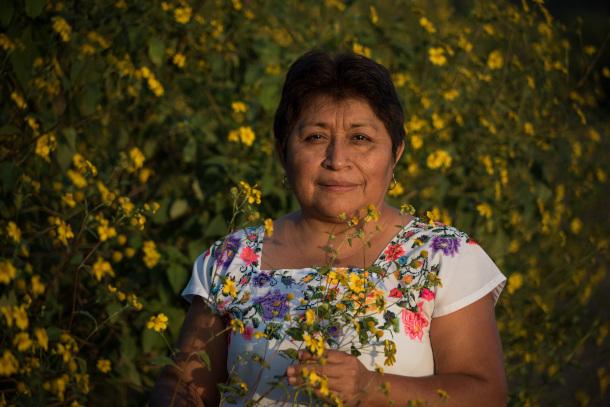Leydy Pech, a Mayan beekeeper who organized a grassroots campaign to stop the use of genetically modified soybeans and glyphosate on her people’s territory, is the 2020 Goldman Environmental Prize recipient for North America.
For the Mayan communities of northeastern Mexico, beekeeping is a sacred practice that goes back more than 3,000 years, and the forests of the Yucatan peninsula, full of flowering plants, are an ideal location for raising bees and producing honey.
But starting in 2012, farmers in the region began growing soybeans that had been genetically modified so they could be sprayed with the herbicide glyphosate without damaging the crop, and beekeepers in the region soon had a problem.
Related: An FDA scientist finds traces of weed killer in many common foods
Pech noticed her bees were disoriented and dying on a large scale. So, she began organizing her community to push back against the use of glyphosate on their land.
Her efforts went all the way to the Mexican Supreme Court, which ruled five years ago that Indigenous peoples must be consulted before GMO soy beans and glyphosate can be used on their lands.
“My relationship with bees has been ancestral. … Beekeeping is a patrimony for Indigenous community, and honey provides an essential income for Mayan families.”
“My relationship with bees has been ancestral,” Pech says. “My grandparents kept bees and they mostly took care of a bee called Melipona beecheii. But the bee hives were kept in the forest, a more natural way of beekeeping. In my municipality, most families are beekeepers, and a large part of the honey production is exported to Europe. So beekeeping is a patrimony for Indigenous community, and honey provides an essential income for Mayan families.”
About a decade ago, when farmers started growing genetically modified soybeans in seven Mexican states along the Yucatan Peninsula, there were “serious effects on our land and bees,” Pech says, including deforestation, which led to loss of animals and medicinal plants, water contamination and health problems from permanent exposure to pesticides.
Related: Bayer faces billion-dollar losses related to legal claims of deadly Roundup herbicide
“When agricultural permits were given for GMO soy production, there weren’t adequate environmental studies conducted and our dependence on the forest for sustenance had not been taken into consideration,” Pech adds.
The first thing Pech began to observe was the death of bees at a massive rate. Contrary to what the beekeepers had been told, bees do pollinate soybeans, so they were ingesting the glyphosate. Glyphosate has been categorized as a possible carcinogen by the World Health Organization. Farmers also applied other dangerous pesticides, such as chlorpyrifos, which badly affect the bees, Pech says.
“The bees started producing less honey because of deforestation for soybeans. … Less forest means less honey, which means less money for families who keep bees. The killing of our bees has led to more poverty in our communities.”
“As my bees began to leave their hives in search of nectar, they became disoriented, got lost and stopped coming back,” she explains. “Also, the bees started producing less honey because of deforestation for soybeans. Bees depend on the plants in the forest to produce honey. So, less forest means less honey, which means less money for families who keep bees. The killing of our bees has led to more poverty in our communities.”
Related: Is an ‘insect apocalypse’ happening? How would we know?
Pech began to organize, inviting women and leaders from the surrounding communities to meetings. Mining organizations showed solidarity and helped with legal support. The beekeepers conducted studies which proved that the water supply had glyphosate residue and glyphosate residue was found in the urine of children and field workers.
Ultimately, in 2015, the Mexican Supreme Court unanimously ruled that the government must consult Indigenous communities before they plant genetically modified soybeans. Unfortunately, the ruling “was not respected by Mexican authorities,” Pech says. “Today, transgenic soy is still being cultivated in our land. In 2018, as a collective Mayan community, we decided to wait for the incoming government and appeal to them to respect our rights.”
“The new government promised that they would respect the consultation process, but that didn’t happen. … Today, we keep fighting for recognition and respect of our sovereignty as an Indigenous community.”
“The new government promised that they would respect the consultation process, but that didn’t happen,” Pech continues. “Unfortunately, the situation remains the same with the current government. Today, we keep fighting for recognition and respect of our sovereignty as an Indigenous community.”
For Pech, the Goldman Prize highlights her determination to continue the fight.
“I think that struggles like these are long and generational and it’s our responsibility to involve our children and our grandchildren in our fight for justice,” she says. “Because at the end, having land to call your own is having a sense of belonging. So what follows with a prize is to continue with the work. This award reaffirms my conviction to defender my territory.”
This article is based on an interview with Bobby Bascomb that aired on Living on Earth from PRX.
